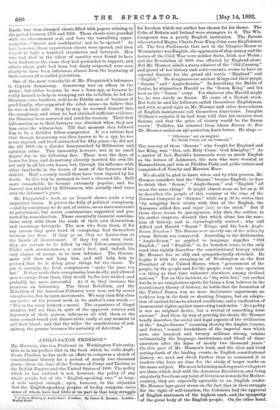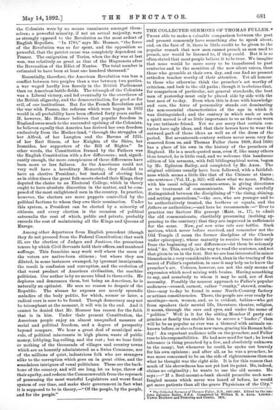ANGLO-SAXON FREEDOM.*
Mn. ROBBER, who is a Professor in Washington University, tells us in his preface that in the book which he calls Anglo- Saxon Freedom, he has made an effort to compress a sketch of constitutional history for a period of nearly two thousand years,—from the time of the Teutons of Cmsar and Tacitus, to the British Empire and the United States of 1890. The polity which he has outlined is not, however, the polity of any single people, but of the "English-speaking race" at large. A wide subject enough ; open, however, to the objection that the English-speaking peoples of to-day comprise races some of whom have had little or no part in that long struggle • 4 Short History of Anglo-Bacon FreSdemv By aames E. Boomer. London - Waltes.aoott.
for freedom which our author has chosen for his theme. The Celts of Britain and Ireland were strangers to it. The Wit- tenagemot was a purely English institution. The Barons who extorted Magna Charta from King John were Englishmen all. The first Parliament that met in the Chapter-House at Westminster was English; the opponents of ship-money and the heroes of the Civil War were neither Scots, Irish, nor Welsh ; and the Revolution of 1688 was effected by England alone. But Mr. Hosmer, albeit a warm admirer of the "Old Country," and proud of her history and achievements, seems to have an especial distaste for the grand old words "England" and "English." He designates our ancient Kings and their people " Saxons " and "Anglo-Saxons." In describing the Battle of Senlac, he stigmatises Harold as the "Saxon King," and his host as the " Saxon " army. Yet whatever else Harold might be, he was surely no Saxon. He came of a Danish stock. But both he and his followers called themselves Englishmen, and with as good right as Mr. Hosmer and other descendants of English immigrants call themselves Americans. Imagine William's surprise if he had been told that his enemies were Saxons, and that the prize of victory would be the Saxon crown ! Taillefer, his minstrel, from whose Roman de .Rou Mr. Roamer makes an apt quotation, knew better. He sings :— " Olicrosse' est en engleiz Ke Saint Croix eat en francais."
The war-cry of these " Saxons " who fought for England and her King, was, "Out, out, Holy Cross ! God Almighty !" As a matter of fact, Harold's housecarls were as much English as the heroes of Agincourt, the men who were worsted at Bannockburn and won at Flodden Field, and as the victors and vanquished of Naseby and Marston Moor.
We should be glad to know when, and by what process, Mr. Homer considers that the " Saxons" became English ; or does he think that "Saxon," "Anglo-Saxon," and " English " all mean the same thing? It might almost seem so, for on p. 38 he describes the people of this country at the time of the Norman Conquest as "Saxons," while on p. 39 he writes that "by mingling their strain with that of the English, the Normans added fire and vigor Csic] to the stock." But if these three terms be synonymous, why does the author, in his earlier chapters, discard that which alone has the sanc- tion of history, and is etymologically correct ; why call Alfred and Harold " Saxon " Kings, and his book Anglo- Saxon Freedom ? The Saxons were merely one of the tribes by whom Britain was conquered. According to the dictionaries, " Anglo-Saxon," as applied to language, signifies "Old English ; " and "English," in its broadest sense, is the only word that rightly describes the constitutional history which Mr. Hosmer has so ably and sympathetically sketched. He begins it with the swearing-in of Washington as the first President of the United States, when "government of the people, by the people and for the people, went into operation —a thing at that time unknown elsewhere among civilised nations." Yet on this incident, so "big with fate," our author dwells in no vainglorious spirit, for being a firm believer in the evolutionary theory of history, he holds that the formation of the United States was no mere doctrinaire experiment, no reckless leap in the dark or shooting Niagara, but an adapta- tion of ancient forms to altered conditions, and a vindication of immemorial rights against innovating tendencies. "As a polity it was no original device, but a revival of something most ancient." And then, by way of proving his thesis, Mr. Hosmer briefly describes the social and legal aspects of the civilisation of the " Anglo-Saxons " (meaning thereby the Angles, axons, and Jutes), "remote forefathers of the imperial race which now, one hundred and twenty millions strong, retains substantially the language, institutions, and blood of those ancestors after the lapse of nearly two thousand years." On this part of Mr. Hosmer's book, and his clear and vivid setting-forth of the leading events in English constitutional history, we need not dwell further than to commend it to readers who have no time for the study of larger works on the same subject. His most informing and suggestive chapters are those which deal with the American Revolution, and being singularly free from any taint of bitterness towards the Mother- country, they are especially agreeable to an English reader. Mr. Hosmer lays great stress on the fact that in their struggle for the right of self-taxation, the Colonists had the approval of English statesmen of the highest rank, andthe sympathy of the great body of the English people. On the other hand,
the Colonists were by no means unanimous amongst them- selves ; a powerful minority, if not an actual majority, were as strongly opposed to the Revolution as the most ardent of English Royalists. "In 1780," says Mr. Hosmer, "the force of the Revolution was so far spent, and the opposition so powerful, that the patriot cause was completely dependent on France. The emigration of Tories, when the day was at last won, was relatively as great as that of the Huguenots after the Revocation of the Edict of Nantes. The total number is estimated to have been at least one hundred thousand."
Essentially, therefore, the American Revolution was less a conflict between two peoples than a war between two parties, a war waged hardly less fiercely in the British Parliament than on American battle-fields. The triumph of the Colonists was a Liberal victory, and led eventually to the overthrow of the British oligarchy, and the democratisation, for good or for evil, of our institutions. But for the French Revolution and the war with France, the reforms which were begun in 1832 would in all probability have been effected forty years earlier. If, however, Mr. Hosmer believes that popular freedom in England owes much to the successful uprising of the Colonists, he believes equally that America has derived her own freedom exclusively from the Mother-land, "through the struggles of her Alfred, of her Langton and the Barons of 1215, of her Earl Simon, of her Knights of the Shire, her Ironsides, her supporters of the Bill of Rights." In other words, the Constitution framed by the Fathers was the English Constitution with a few differences ; and, signifi- cantly enough, the more conspicuous of these differences have been more or less failures. As the Americans could not very well have a hereditary Monarchy, they decided to have an elective President ; but instead of electing him as in olden times the great folk-moots elected their Kings, they deputed the choice to an Electoral College, which in theory ought to have absolute discretion in the matter, and be com- posed of the most enlightened men in the country. In practice, however, the electors are mere puppets controlled by the political factions to whom they owe their nomination. Under this system, a President can be elected by a minority of citizens, and every election is the occasion of political saturnalia the cost of which, public and private, probably exceeds the cost of maintaining all the Kings and Queens of Europe.
Among other departures from English precedent (though they do not proceed from the Federal Constitution) that work ill, are the election of Judges and Justices, the precarious tenure by which Civil Servants hold their offices, and manhood suffrage. This franchise may work well where the mass of the voters are native-born citizens ; but where they are diluted, in some instances swamped, by ignorant immigrants, the result is confusion and corruption, and the evolution of that worst product of American civilisation, the machine politician. Our author is by no means blind to these evils. He deplores and denounces them, but being an American, he is naturally an optimist. He sees no reason to despair of the Republic. The abuses he exposes are merely sporadic maladies of the body politic, for which, sooner or later, a radical cure is sure to be found. Though democracy may not be triumphant at the moment, it will win in the end. And it cannot be denied that Mr. Hosmer has reason for the faith that is in him. Under their present Constitution, the American people enjoy an almost unequalled measure of social and political freedom, and a degree of prosperity beyond compare. We hear a great deal of municipal mis- rule, of political miscreants in high places, waste of public money, lobbying, log-rolling, and the rest ; but we hear little or nothing of the thousands of villages and country towns which are as honestly administered as a Swiss Commune, nor of the millions of quiet, industrious folk who are strangers alike to the corruption which goes on in great cities, and the scandalous intrigues of venal politicians. These are the back- bone of the country, and will ere long, let us hope, throw of their apathy, and redeem the Commonwealth from the reproach of possessing the most wasteful Legislature and worst fiscal system of our time, and make their government in fact what
• it is supposed to be in theory,—" Of the people, by the people, And for the people."







































 Previous page
Previous page